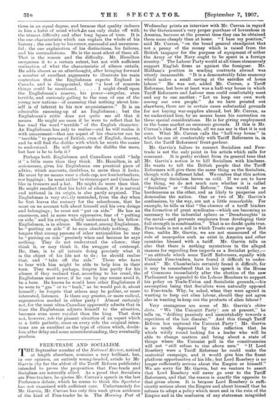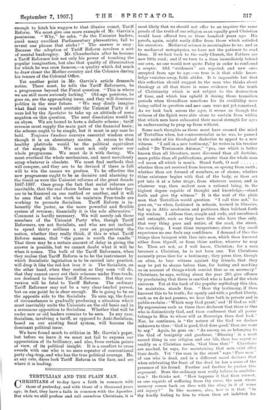FREE-TRADE AND SOCIALISM. T HE September number of the National Review,
noticed at length elsewhere, contains a very brilliant, but, in our opinion, an entirely wrong-headed, article by Mr Garvin (by far the ablest of the Tariff Reform publicists) intended to prove the proposition that Free-trade and Socialism are naturally allied. As a proof that Socialists are Free-traders, he quotes Mr. Curran's speech in the last Preference debate, which he seems to think the Spectator has not examined with sufficient care. Unfortunately for Mr. Garvin, Mr. Curran has only this week given evidence of the kind of Free-trader he is. The Morning Post of Wednesday prints an interview with Mr. Curran .in regard to the Government's very proper purchase of horseshoes in America, because at the present time they can be obtained. there more cheaply than at home. "I .base my position," said Mr. Curran, "on the broad general standpoint that not a penny of the money which is raised from. the British taxpayer for the purpose of equipment of either the Army or the Navy ought to be spent in a foreign country." The Labour Party would at all times strenuously. support English firms as against the foreigner. Mr. Haldane's position in sending contracts abroad was utterly inexcusable. "It is a demonstrably false economy which makes a small saving at the sacrifice of home labour." He was not, added Mr. Curran, a Tariff Reformer, but here at least was a half-way house in which Tariff Reformers and Labour men could comfortably meet and say to one another : "Let us keep our own work among our own people." As we have pointed out elsewhere, there are in certain cases substantial grounds for not buying war-supplies abroad, but Mr. Curran, as we understand him, by no means bases his contention on these special considerations. He is for giving employment in the home market on economic grounds. If this is Mr. Curran's idea of Free-trade, all we can say is that it is not ours. What Mr. Curran calls the "half-way house" in which be can sit comfortably with Tariff Reformers is, in fact, the Tariff Reformers' front-parlour.
Mr. Garvin's failure to connect Socialism and Free- trade is not the only point in his article which calls for comment. It is pretty evident from its general tone that Mr. Garvin's notion is to kill Socialism with kindness. He wants to tell the British people that the Tariff Reformers will give them the same thing as the Socialists, though with a different label. We confess that this notion of fighting Socialism leaves us cold. If we are to have the thing, we do not much care whether it is called. " Socialism " or "Social Reform." One would be as burdensome as the other, and as .likely to pauperise and demoralise the nation. One or two of Mr. Garvin's confessions, by the way, are not a little remarkable. For example, he tells us that "the absence of a tariff hinders the formation of great syndicates—which are becoming as necessary to the industrial sphere as ' Dreadnouahts ' in the naval—and prevents employers from developing their full strength in combination." That is no doubt quite true. Free-trade is not a soil in which Trusts can grow up. But then, unlike Mr. Garvin, we are not enamoured of the rule of monopolies such as exist in America and other countries blessed with a tariff. Mr. Garvin tells us also that there is nothing mysterious in the alleged reasons for regarding free imports as a Socialist policy,— " an attitude which some Tariff Reformers, equally with Unionist Free-traders, have found it difficult to under- stand." Mr. Chamberlain certainly found it difficult, for it may be remembered that in his speech in the House of Commons immediately after the election of the new Parliament he appealed to the Llbour Members to support his policy on Trade-Union and Socialistic grounds,—his assumption being that Socialists were naturally opposed. to Free-trade. Why, lie asked, when they were agreed. in wanting to keep out alien labour, should they not agree also in wanting to keep out the products of alien labour ?
Very courageous are sonic of Mr. Garvin's °biter dicta. "We [the 'Unionist Party] are at present," he tells us, "drifting passively and unmistakably towards a repetition of the last disaster." And this though Tariff Reform has captured the Unionist Party ! Mr. Garvin is so much depressed by this reflection that be whirls wildly round looking for a leader who will be able to change matters and bring about a state of things where the Unionist poll in the constituencies will not "still refuse to rise above zero." "If Lord. Rosebery were a Tariff Reformer he could. make the oratorical campaign, and it would give him the finest platform opportunities of his life ; but Lord Rosebery is no longer sufficiently serious about the Empire or himself." We are sorry for Mr. Garvin, but we venture to assert that Lord Rosebery will never go over to the Tariff Reformers, and that the reason is exactly the opposite to that given above. It is because Lord Rosebery is suffi- ciently serious about the Empire and about himself that he refuses to adopt a policy which must end in the ruin of the Empire and in the confusion of any statesman misguided enough to hitch his waggon to that illusive comet, Tariff Reform. We must give one more example of Mr. Garvin's pessimism. "Why," he asks, "do the Unionist leaders, amid many excellent Parliamentary pleasantries, fail to invent one phrase that sticks ? " The answer is easy : Because the adoption of Tariff Reform involves a sort of mental bankruptcy. Mr. Chamberlain after he became a Tariff Reformer lost not only his power of touching the popular imagination, but also that quality of illumination for which he was once famous,—a quality which did much to draw closer the Mother-country and the Colonies during his tenure of the Colonial Office.
Yet another point in ,Mr. Garvin's article demands notice. There must, he tells the Tariff Reformers, be a programme beyond the Fiscal question. "This is where we are still more seriously lacking." Old-age pensions, he goes on, are the approaching issue, and they will dominate politics in the near future. "We may dimly imagine what final ruin would overtake the Unionist Party if it were led by the Spectator to take up an attitude of mere negation on this question. The next dissolution would be au abyss. We are bound to have a definite scheme ; tariff revenue must supply the main part of the financial basis ; the scheme ought to be simple, but it must in any case be bold. Toujours l'audace conveys essential wisdom even though it is an elementary maxim. A return to that healthy platitude would be the political equivalent of the simple life. We must not only revise our whole programme. We must do it with daring. We must overhaul the whole mechanism, and most mercilessly scrap whatever is obsolete. We must find methods that will conquer, and they are to be devised if there is full will to win the causes we profess. To be effective the new programme ought to be as decisive and alarming to the timid as were the Unionist reforms of the great decade 1887-1897. Once grasp the fact that social reforms are inevitable, that the real choice before us is whether they are to be financed on one method or another, and it will be seen that all who work to maintain Free-trade are working to promote Socialism. Tariff Reform is in- herently the Juster, as the more powerful and flexible system of revenue; financially it is the sole alternative." Comment is hardly necessary. We will merely ask those members of the Unionist Party who, though Tariff Reformers, are not Socialists, and who are not inclined to spend thirty millions a year on pauperising the nation, whether they really think, if this is what Tariff Reform means,. that "the game is worth the candle." That there may be a certain amount of delay in giving the answer is possible, but we cannot doubt what it will be when it comes. The bulk of the Tariff Reformers, when they realise that Tariff Reform is to be the instrument by which Socialistic legislation is to be carried into practice, will drop it like the red-hot iron it is. The Socialists, on the other hand, when they realise, as they soon -Till do, that they cannot carry out their schemes under Free-trade, are destined to become Tariff R3formers. But that con- version will be fatal to Tariff Reform. The ordinary Tariff Reformer may not be a very clear-headed person, but on one point he is clear enough. He is going to be on the opposite side to the Socialists. To sum up, the force of circumstances is gradually producing a situation which must inevitably unite the Unionists on the old basis and in a strenuous opposition to Socialism. Whether that will be under new or old leaders remains to be seen. In any case, Socialism, involving a tariff, as opposed to Anti-Socialism, based on our existing fiscal system, will become the dominant political issue.
We have found much to criticise in Mr. Garvin's paper, but before we leave it we must not fail to express our appreciation of its brilliancy, and also, from certain points of view, of its political insight. It is a comfort to cross swords with one who is no mere repeater of conventional party clap-trap, and who has the true political courage. He, at any rate, dares look Tariff Reform in the face, and see where it is leading.







































 Previous page
Previous page